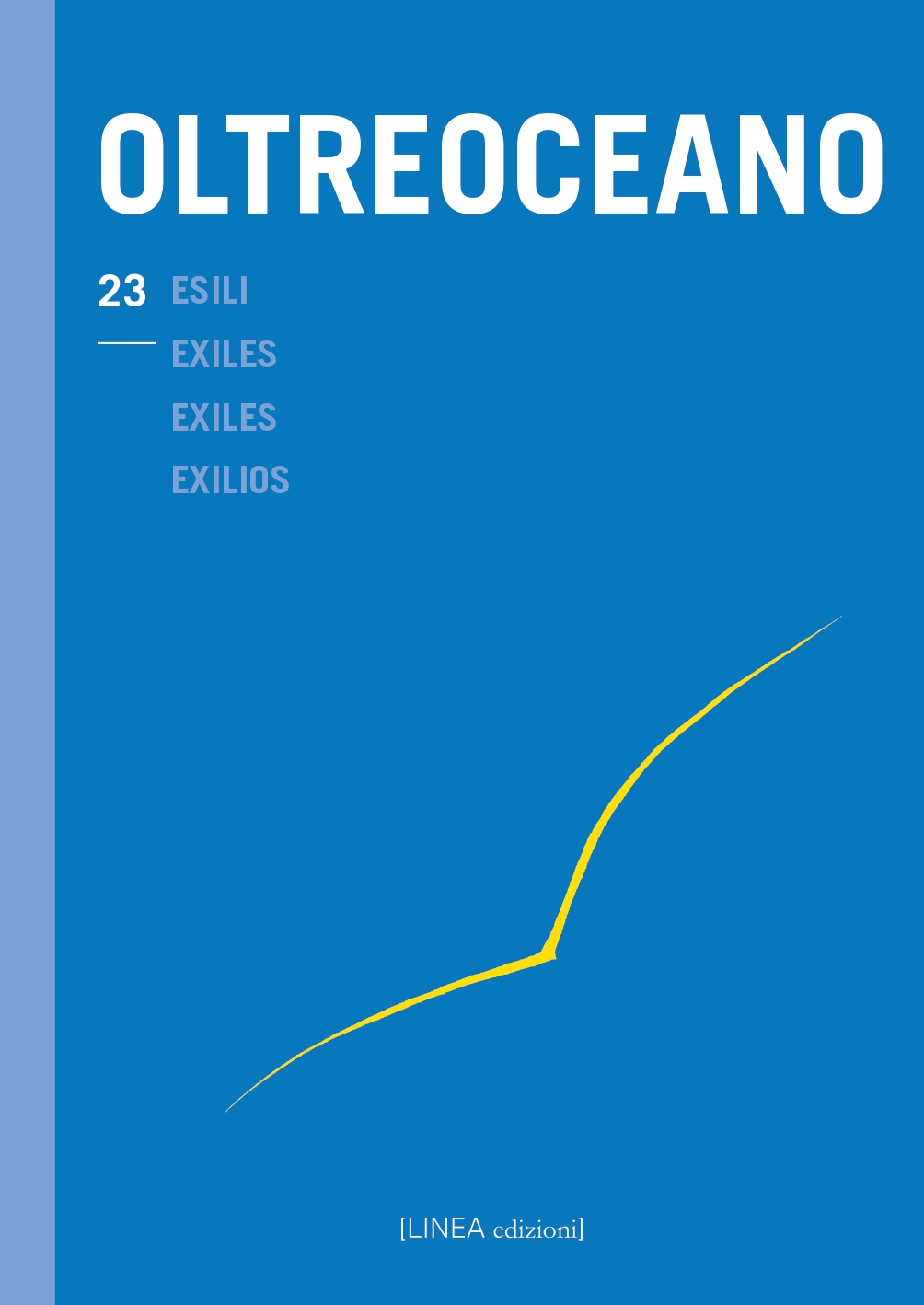Juan Rodolfo Wilcock, a case of linguistic self-exile in two stages
DOI:
https://doi.org/10.53154/Oltreoceano109Keywords:
J. R. Wilcock, Voluntary Linguistic Exile, Horizontal Self-translation, Bilingualism, Italian-Argentine PoetryAbstract
This paper focuses on the case study of J.R. Wilcock, a multilingual Italian-Argentine writer who changed the language of literary expression, going from the native language (River Plate Spanish) to the acquired language (Italian). Wilcock's is an example of voluntary territorial and linguistic exile, brought about by his differences with Peronism and by the desire to return to his Italian (biological family) and Latin (linguistic family) roots. This transition from one language to the other, a way of territorial and symbolic uprooting at the same time, was progressive. We identify two phases: the consecutive self-translation from Spanish to Italian practiced in Poesie spagnole, a book published in 1963 with a poetic selection from the 40s and 50s, and the adoption of the second language from Luoghi comuni (1961). Then, he will no longer write in Spanish or self-translate from L2 to L1. Hypotheses are presented about the reasons for code switching linked to the principle of linguistic complementarity, the rejection of transcreation and distrust in the functional adherence of any translation. Wilcock’s decision to translate himself was a way of exercising control over the fidelity of the Spanish originals that he wanted to present to the Italian public without losing the opportunity to disseminate a representative sample of his Argentine poetic prehistory and to pay tribute to him, still with nostalgia. Later, his voluntary exile would be fulfilled in the language, with the definitive change to Italian of his ancestors on the maternal side. In these compositions he will renounce vernacular, popular and regional brands (both Italian and Spanish) in a diachronic travel back to the common ideal of a lost Latinity. Wilcock’s linguistic exile questions the idea of “border” understood as a defining space of a subject's identity, revealing the capacity of language to construct new personal and literary identities throughout life.
Downloads
References
Balderston, D. (1985): La literatura antiperonista de J.R. Wilcock. Revista Iberoamericana, 135-136, pp. 574-581.
Borges, J. L. (2016): Poesía completa. Buenos Aires: Emecé.
Bourbotte, J. (2017): Una imagen de Wilcock. Selección y marcaje de sus textos autotraducidos al italiano. Cuadernos del Hipogrifo, 7, pp. 46-58.
Carli, A. (2001): Aspetti linguistici e interculturali del bilinguismo. Milano: FrancoAngeli.
Carmello, M. (2020): L’altra lingua di J. Rodolfo Wilcock. Mosaico italiano, XIII, 192, pp. 21-23.
Ciortea R. & R. A. Vîlceanu (2019): Exilio lingüístico, viaje sin mapas. Quaestiones romanicae, VII, pp. 63-68.
Fabbri, L. (2005): H.G. Gadamer, Linguaggio. Il giornale di filosofia, 45. Recuperado de http://www.giornaledifilosofia.net/public/scheda_rec.php?id=45#inizio (Visitado el 18/04/2024).
Favero, G. (1973): Un’ora con Rodolfo Wilcock. Recuperato da https://www.youtube.com/watch?v=ua_DQf92oJs (Visitado el 20/04/2024).
Ferrante, F. (2022): Juan Rodolfo Wilcock critico. Pisa: ETS.
Gadamer, H.-G. (2005): Linguaggio. D. di Cesare (Trad.). Roma: Laterza.
Grosjean, F. (2015): Bilinguismo. Miti e realtà. Milano-Udine: Mimesis.
Grutman, R. (2011): Diglosia y autotraducción vertical (en y fuera de España). En X. M. Dasilva & H. Tanqueiro (eds.). Aproximaciones a la autotraducción (pp. 69-91). Vigo: Editorial Academia del Hispanismo.
Martínez Pérsico, M. (2016): Formas del insilio en la literatura ecuatoriana del siglo XX. Proyección iberoamericana de Medardo Ángel Silva, Hugo Mayo y Jorge Icaza. Quito: Corporación Editora Nacional / Universidad Andina Simón Bolívar.
Munaro, A. & Serra Bradford, M. (2021): Aprovechemos que hay una fuente. Revista Ñ, 24 de febrero, p. 18.
Pessoa, F (1982): Livro do Desassossego. Lisboa: Ática.
Piva, C. (2007): Considerazioni preliminari sul bilinguismo. Cosenza: Erranti.
Wilcock, J. R. (1963): Poesie spagnole. Parma: Guanda.
Wilcock, J. R. (1980): Poesie. Milano: Adelphi.
Wilcock, J. R. (2010): Italienisches Liederbuch / 34 poemas de amor. G. Piro (Ed. bilingüe Selección y Trad.). Madrid -Buenos Aires: Huesos de Jibia.
Wilcock, J. R. (2020): Aprovechemos que hay una fuente / antología. G. Piro (Ed. bilingüe Selección y Trad.). Buenos Aires: Huesos de Jibia.
Downloads
Published
How to Cite
Issue
Section
License

This work is licensed under a Creative Commons Attribution-NonCommercial-ShareAlike 4.0 International License.
The authors undertake to comply with the following conditions, which are considered accepted at the time of submission of their contributions.
The sending of a text implies that it is unpublished and not submitted to be published elsewhere.
1. If accepted, the author shall confer on the publisher the right to publish and distribute it both in paper form and in the online electronic edition. The published articles will be downloadable and made available in open access.
2. Provided that it correctly indicates that the first publication took place in the journal Oltreoceano. Rivista sulle migrazioni the author has the right to: a) reproduce the article in separate extracts or collected in a volume; b) publish the article on their personal website or teaching site provided that these sites are of a non-commercial nature; c) deposit the article in online archives of a non-commercial nature, linked to the institution they belong to or as part of projects for the non-commercial dissemination and open access of scientific works.
The use of contributions by third parties, for commercial or otherwise unauthorized purposes, is not allowed. The publisher declines all responsibility for the unauthorized use of the material published in the journal.












